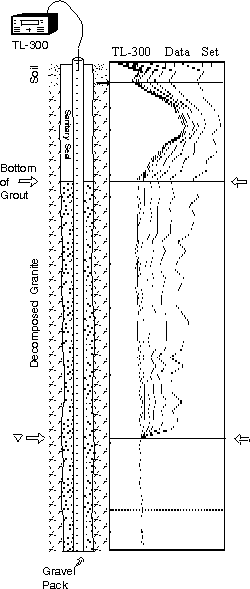
TL-300 Borehole Temperature Logger
|
|
![]()
![]() APPLICATIONS
APPLICATIONS
![]()
Sanitary seal detection
Inflow / Outflow analysis
Crosswell Flow
Production Aquifer Choice
Hydrological Research
The TL-300 is a portable, high resolution, multisensored temperature measurement system designed to aid in the investigation of new and existing water wells. The system consists of a weatherproof, lightweight data logger and an active, multisensored cable assembly. With up to 300 sensors downhole and a resolution of .1°, the TL-300 provides a detailed and essentially continuous temperature profile of a well. This capability adds a new dimension to temperature logging and greatly increases the usefulness of this parameter as a logging tool.
![]() THE LOGGER
THE LOGGER
The battery powered TL-300 is
easily hand carried to the well site where data may be collected
with or without operator intervention, and it may be left
unattended to collect data over long periods of time. Once data
has been collected, it may be transferred to an IBM-compatible
computer for storage and further analysis with the Seistronix
Temperature Utility program . The data may also be transferred to
other programs for additional analysis.
The TL-300 is easy to set up and operate. Options are selected through a series of menus displayed on a large Liquid Crystal Display (LCD), and help is available at any point by pressing the <HELP> key. For many situations the set up simply involves specifying the depth of the cable.
Once the TL-300 is set up, data recording is initiated by pressing <START>. At this point, the instrument scans the sensors in the cable assembly, taking a reading (sample) from each sensor. This reading is stored in the TL-300's internal memory. Data recording will continue at the programmed sample rate (from every 5 seconds to once per hour) until <STOP> is pressed. The recorded data remains in memory even when the instrument is turned off. Up to eight different logging sessions may be stored in the TL-300 at one time.
During recording, the LCD screen shows a bar graph display of depth vs. temperature data for all (or selected) sensors downhole. After sampling is stopped, the stored temperature data can be played back on the screen at high speed, condensing the depth vs temperature changes that occurred over the recording interval (which might be 10 minutes, 10 hours or 10 days) into just a few seconds. This allows subtle changes in the temperature gradient and long term trends to be easily to detected.
![]() THE CABLE
THE CABLE
The standard cable section is
120' long with small integrated circuit sensors molded into the
cable every two feet (other sensor spacings are available). This
cable is connected to a short lead-in cable which plugs into the
data logger.
The cable is small enough to fit down a two inch diameter hole. Cable sections may be added to the TL-300 in the field. Up to five cable sections may be connected together for a total cable length of 600'. For deeper applications, a longer lead-in cable or a wider sensor spacing may be used.
The cable is jacketed in artificial rubber, is neutrally buoyant in water, remains flexible at low temperatures, and is not affected by most chemicals or sunlight.
![]() TL-300 ADVANTAGES
TL-300 ADVANTAGES
The TL-300 has three major
advantages over single sensor loggers, which can make make most
borehole temperature logging operations easier, less expensive,
and more accurate.
Single sensor logging
requires an operator at the hole for each logging run.
With TL-300 the hole can be logged unattended over long
periods of time with no operator intervention.
In single sensor logging, the
sensor must be moved up the hole, disturbing the
temperature gradient in the hole.
Once the the TL-300 is inserted into the well, it doesn't
have to be moved.
Because a single sensor
logger requires minutes and often hours to log even a
medium depth hole, the temperature may change
dramatically at one end of the hole by the time the
sensor reaches the other end. The TL-300 records data
from all sensors (up to 300 sensors) in less than one
second.
![]() SPECIAL APPLICATIONS
SPECIAL APPLICATIONS
|
Gravel/Cement grout
location In the adjacent example, the TL-300 was used to log a well two days after the sanitary seal was placed in the well. Each line in the TL-300 data set represents a temperature profile of the well taken at 30 minute intervals. Even after waiting 48 hours to log the well, the bottom of the seal can be very clearly seen. |
 |
Production
Aquifer Choice
In many water
wells, two or more aquifers are encountered during drilling.
Assuming that there is a temperature differential between
aquifers, the TL-300 system may be used during pump test to
determine the most productive aquifer.
| Phone: (916) 851-1890 |
Fax: 916-851-1852 |
Email: sales@seistronix.com |
|
Mailing
Address: |